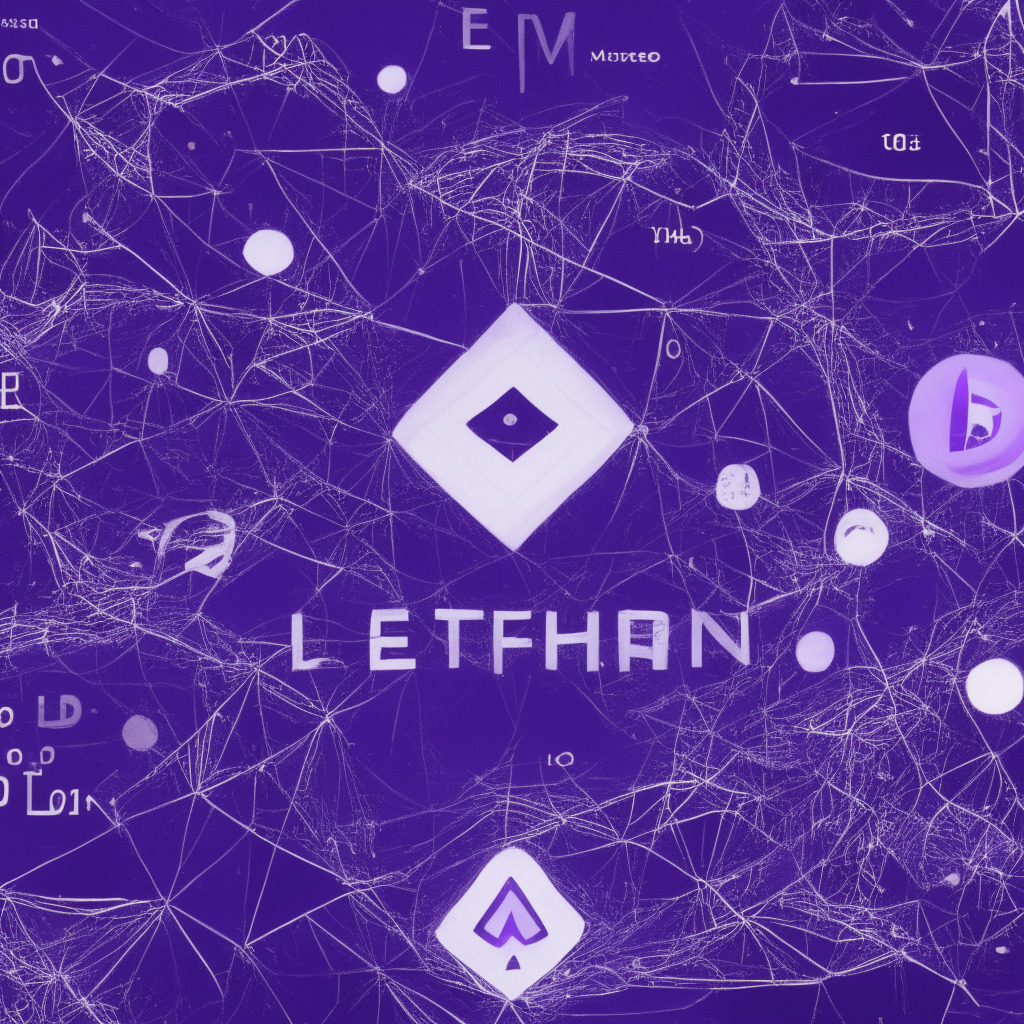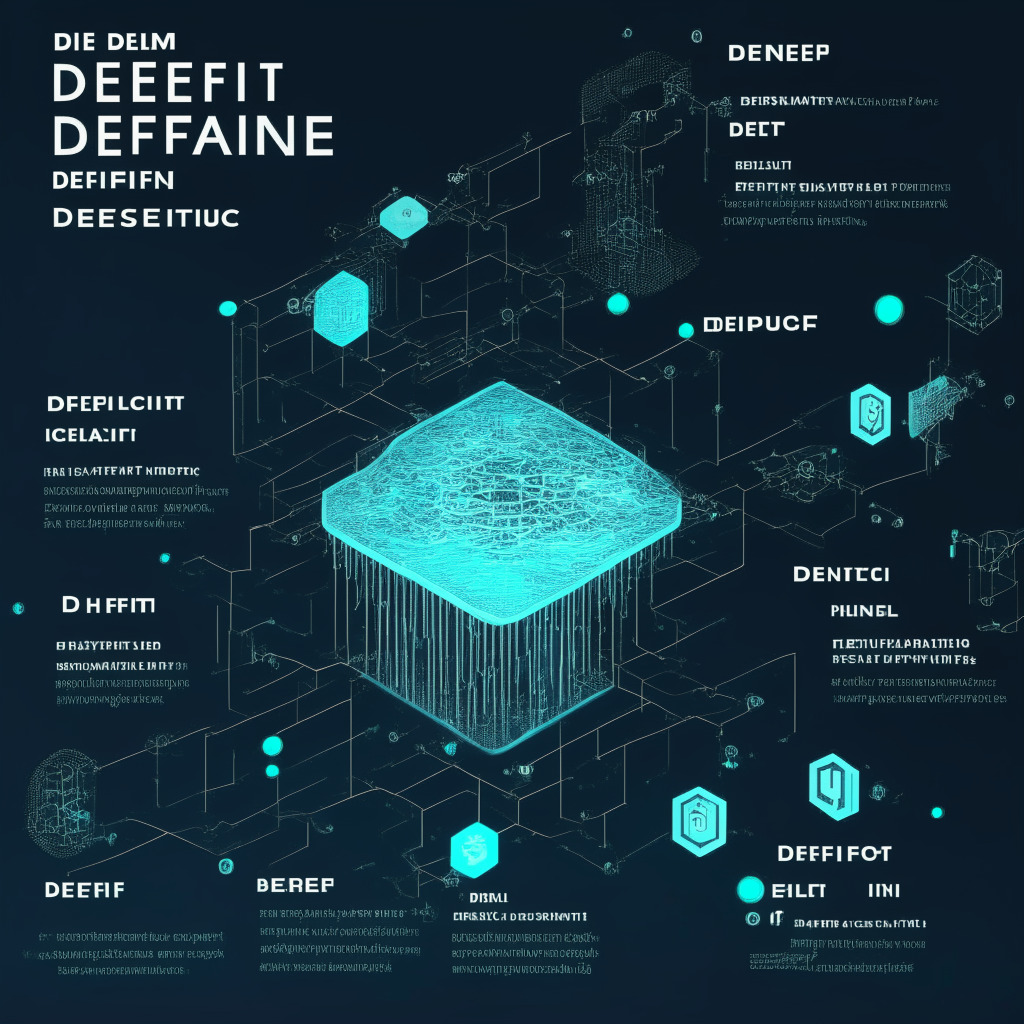Coinbase’s CEO, Brian Armstrong, urges decentralized finance (DeFi) protocols to establish legal precedence amidst the unclear regulatory environment. This move, according to Armstrong, is crucial to prevent the crypto industry from being directed towards foreign jurisdictions. His comments follow enforcement actions by the U.S. CFTC on DeFi companies for purported illicit trading activities.
Search Results for: crypto derivatives protocol
Regulatory Scrutiny vs Technological Advancements: Navigating the Complex Crypto Landscape
Despite regulatory challenges and hacking threats, the crypto sphere continues to innovate, with enhanced privacy, user experience, and transaction efficiency. As Ethereum plans a major transformation and Ripple maintains its legal standing, the tokenized assets market could reach $16 billion by 2030. However, effective regulation remains vital to safeguard all stakeholders.
Regulatory Thunderbolt: CFTC vs DeFi Protocols – A Necessary Crackdown or Mere Ambiguity?
“U.S. regulatory body, CFTC, has charged DeFi protocols Opyn, 0x, and Deridex for conducting illegal derivatives trading via blockchain protocols and smart contracts. The protocols have accepted the penalties, implying cooperation for a swift resolution. The response raises questions about the future handling of similar DeFi controversies.”
DeFi Giants Fined by CFTC: A New Era of Crypto Regulation or a Setback for Financial Innovation?
“The Commodity Futures Trading Commission (CFTC) has charged DeFi players Opyn, Inc., ZeroEx (0x), Inc., and Deridex, Inc. with illegal derivatives trading via blockchain-based protocols and smart contracts. The shift indicates that regulations are catching up in the crypto industry, particularly for DeFi platforms.”
Ethereum’s Liquid Staking Derivatives: A $24 Billion Surge on the Horizon or the Next Bubble?
Ethereum’s Liquid Staking Derivatives market could potentially add $24 billion to its total value within two years, according to HashKey Capital. Through staking, this market yielded a total value of over $22 billion this year. However, increased investor participation could lead to diminishing staking yields, which may be offset by the versatility of DeFi protocols.
Ethereum’s Future Hangs in Balance: The Impact and Risks of Liquid Staking Derivatives
“Liquid Staking Derivatives (LSD) pose potential harm to the Ethereum ecosystem due to the centralization of node operators. This centralization reduces competition, opens up potential for censorship, increases risk of diminished security and risks collusion. The solution may lie in distributed validator technology to enhance decentralization.”
Decoding DeFi Yield Mystery & Resilience Amid Crypto Turbulence: Insights from Maverick Protocol CEO
“Alvin Xu, CEO of Maverick Protocol, offers insights into the constantly changing world of Decentralized Finance (DeFi). He emphasizes the precariousness of DeFi’s high yields and the potential pitfalls of users focusing solely on yield chasing, compromising the sustainability and quality of products. Meanwhile, despite market volatility, mining companies remain optimistic about future price appreciation.”
The Crypto Rollercoaster: A Week of Breakthroughs, Setbacks and Controversy
“Bitcoin continues to attract institutional investors, while Ethereum users propose ERC 7265 to counter DeFi hacks. Solana’s liquid staking protocols see a 91% surge, hinting at mainstream market’s growing crypto acceptance. Yet, regulatory tensions, security concerns, and the rise of crypto-related cybercrimes pose significant challenges in the crypto landscape.”
DeFi Tranching: Revolutionizing Crypto Investments for Risk-Averse and Aggressive Investors
Struct Finance introduces an innovative tranching mechanism in the DeFi space, offering tailored financial products for varying risk appetites. This permissionless method allows customized investment models, catering to both conservative and high-risk investors, potentially bringing stability and predictability to crypto investments.
DBA Crypto’s Struggles: Fundraising, Team Exodus, and Evolving Strategies in a Turbulent Market
DBA Crypto, a highly anticipated cryptocurrency fund, faces struggles with team members leaving and reduced fundraising goals. Shifting its focus to crypto-native venture-style investing, DBA highlights the challenges many crypto projects face in raising funds in a competitive and uncertain market.
SEC Crackdown Effects on Crypto Volatility: Analyzing Market Reactions and Altcoin Impact
The SEC’s crackdown on Binance and Coinbase hasn’t significantly impacted Bitcoin’s options-based implied volatility metrics, as traders anticipated and accounted for the lawsuits. The recent actions primarily affect altcoins, while consequences on the value and performance of major cryptocurrencies, such as BTC and ETH, remain relatively minimal.
Navigating Low Volatility in Crypto: Strategies and Investment Opportunities
Cryptocurrency markets are known for volatility, but recent stability has opened doors for new investment opportunities. Strategies like lending tokens, staking, and using derivatives can generate income in low volatility periods. Managing risk and understanding market conditions are crucial.
Ethereum Liquid Staking Derivatives: Reviving DeFi or Introducing New Risks?
DeFi-focused Ethereum liquid staking derivatives (LSD) platforms show potential for reviving Ethereum’s network activity. With gas consumption dropping in DeFi protocols, LSDfi leverages LSD token liquidity in DeFi applications for higher yields, despite potential smart contract risks.
DeFi Derivatives Trading: Vega Protocol’s VEGA Token Surges Amid Launch Hype and Challenges
Cryptocurrency token Vega Protocol’s VEGA experienced a 20% growth in value within a week, coinciding with the platform’s upcoming launch. Vega Protocol facilitates creation and trading of derivatives through DeFi and is set to impact the industry, despite potential challenges and regulatory uncertainties.
BlockFi Liquidates Amid Debates and Regulatory Shifts: How It Affects Crypto’s Future
Bankrupt crypto lender BlockFi plans to liquidate its platform, citing regulatory developments as a factor. Meanwhile, the SEC dismissed Coinbase’s lawsuit against the agency as “baseless,” and the European Union recently passed Markets in Crypto-Assets (MiCA) legislation, shaping the future European cryptocurrency industry. Legal and regulatory developments continue to impact the crypto industry’s future as the sector evolves.
Lido V2 Upgrade: Pros, Cons, and Impact on Ethereum Staking and Crypto Market Volatility
The Lido V2 upgrade on Ethereum mainnet enables staked Ethereum withdrawals and enhances Ethereum staking experience. However, concerns arise about the impact of these withdrawals on crypto market volatility. Users should remain cautious and conduct thorough market research before investing.
Vega Alpha Mainnet: Revolutionizing Decentralized Derivatives Trading or Facing Uphill Battle?
The Alpha mainnet launch of Vega, a crypto derivatives protocol, offers decentralized trading of financial products, including options and futures. Its community-driven approach, no gas fees, and measures against front-running make it stand out. However, competing in the dynamic DeFi landscape and long-term sustainability remain challenges.
US Crypto Firms Fleeing Regulation: Risks, Rewards, and the Need for Regulatory Clarity
The U.S. regulatory crackdown on cryptocurrencies pushes American crypto firms to explore opportunities abroad, impacting the industry and causing a lack of clarity on essential issues. This shift raises concerns about future growth and emphasizes the need for a well-defined regulatory framework to encourage institutional investment and mainstream adoption.
Tenet: Revolutionizing DeFi with Liquid Staking Derivatives and User-Centric Features
Tenet, a liquid staking derivatives hub, introduces a diversified proof-of-stake mechanism, enhancing liquidity and yield opportunities for users. Combining native gauges, Eva mobile wallet, and strong team support, Tenet aims to capitalize on the $17 billion LSD market while addressing security, usability, and DeFi concerns.
Tenet: Revolutionizing Liquid Staking Derivatives or Risking Platform Security?
Tenet, a Layer 1 blockchain platform, aims to revolutionize the staking and Liquid Staking Derivatives (LSD) experience by simplifying and securing it for users. Leveraging its unique Diversified Proof of Stake (DiPoS) mechanism, Tenet addresses shared security challenges and plans to launch a retail-friendly mobile app to educate users about DeFi.
Tenet Testnet Launch: Revolutionizing LSD Market with Unique Layer 1 Protocol and Security
Tenet, an innovative Layer 1 protocol co-founded by Greg Gopman and Dan Peterson, seeks to revolutionize the Liquid Staking Derivatives market by offering enhanced liquidity and yield opportunities. Its security mechanism, Diversified Proof of Stake (DiPoS), validates the network by re-staking LSDs from supported L1 ecosystems, ensuring long-term security and enabling participation in various DeFi activities.
Navigating the Dichotomy of Blockchain’s Future: Innovation vs Regulation
“Yield Protocol’s decision to cease operations, impacted by decreased demand and strict regulations, juxtaposes with Wirex’s launch of W-Pay, a bridge for decentralized applications and traditional payment infrastructures. The future of blockchain remains uncertain amid these contrasting developments.”
VanEck’s Ethereum Strategy Fund: A Promising Paradigm or Risky Experiment?
VanEck’s Ethereum Strategy Fund (EFUT), set to be listed on the Chicago Board Options Exchange, offers fully-standardized, cash-settled futures contracts. With approval from the Securities and Exchange Commission, these contracts provide exposure to futures without requiring direct exposure to the actual digital asset. This move illustrates the growing trend of crypto-based futures tailored for mainstream investors.
Lido Enlists Cosmos Projects in a Liquid Staking Shift: A Blockchain Tsunami or a Centralization Risk?
“Lido, a significant player in the Ether staking landscape, collaborates with projects from the Cosmos blockchain ecosystem, indicating growing interest in liquid staking. With $16 billion in derivatives, liquid staking has become a major strategy for digital asset investors, providing inter-chain transaction opportunities and increased liquidity while also raising concerns about centralization.”
Coinbase’s New Expansion: A Strategic Move or Industry Pressure?
Coinbase, a top crypto exchange, aims to expand to non-U.S. markets, prioritizing countries with clearer crypto regulations. The company’s strategy includes acquiring licenses, setting operations, and registering in these markets. It points to a lack of crypto-forward regulation in the U.S., potentially impacting its influence in the crypto field.
CFTC’s DeFi Clampdown: Balancing Investor Protection and Blockchain Autonomy
The recent DeFi regulation by the U.S. Commodity Futures Trading Commission (CFTC) has stirred concerns in the crypto community. The fines and cease orders, for alleged non-compliance with registration requirements, could potentially undermine blockchain’s decentralization and autonomy, deterring innovation. Balanced regulation is necessary for investor protection and blockchain development.
Scaling Up: Bitstamp Exchange’s Bold Global Expansion Strategy and Its Market Impact
Bitstamp, a prominent crypto exchange, is reportedly fundraising for an aggressive growth strategy that includes launching new products and services, scaling operations, and expanding in the European, Asian and UK markets. However, the exchange emphatically declares it isn’t for sale.
Unpacking the Success of ProShares Bitcoin Strategy Fund Amid Market Unpredictability
The ProShares Bitcoin Strategy Fund, a pioneer ETF, allows investors to gain bitcoin exposure without owning the cryptocurrency. Contrary to early predictions of underperformance, the fund has closely tracked bitcoin’s price, potentially negating perceived risks of such ETFs.
Leveraging Solana’s SOL for High Returns: The Rise and Risks of Liquid Staking Tokens
Crypto traders are leveraging the Solana blockchain to potentially yield high returns. This is done by staking SOL tokens, obtaining mSOL, and using mSOL as collateral to borrow SOL. Drift Protocol introduced “Super staking”, simplifying this process and offering potential annualized returns up to 10%. However, this method, while offering high-yield opportunities, also carries risks of rapid losses and potential liquidation.
Exploring DeFi and NFT-Driven Altcoin Surges: Profitable Opportunities or Hidden Dangers?
DeFi and NFT-related altcoins like BLUR and ARB experienced double-digit gains recently, as capital shifts from larger assets to these speculative tokens. However, traders must exercise caution and research due to potential risks and market volatility.
Terra Luna Classic’s ICA Host Proposal: Boosting Staking and Quicksilver Integration Pros & Cons
Terra Luna Classic developers have submitted a joint governance proposal to allow multiple interchain account (ICA) host message types for QuickSilver. This aims to enhance the LUNC staking ratio on the Terra Classic chain, enabling interchain staking on any validators, maximizing liquidity, capital efficiency, and improving network security and decentralization, similar to Ethereum’s liquid staking provider, Lido.
SEC Chair’s Alleged Connection to Bankrupt FTX: Ethics Probe Sparks Transparency Debate
SEC Chair Gary Gensler is under investigation by the regulator’s ethics committee due to his alleged connection with Sam Bankman-Fried, founder of the now-bankrupt FTX Derivatives Exchange. This probe revolves around an unapproved Zoom call between them, raising concerns about transparency and fairness in the crypto market.































